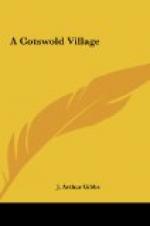Mr. Blunt, in his “Cotswold Dialect,” gives no less than fifty-eight passages from the works of Shakespeare, in which words and phrases peculiar to the district are made use of. Up to the reign of Queen Anne this vast open tract of downland formed a happy hunting ground for the inhabitants of all the surrounding counties. Warwickshire, Oxfordshire, and Wiltshire, as well as Gloucestershire folk repaired to the wolds for hunting, coursing, hawking, and other amusements; and in olden times, even more than to-day, Cotswold was, as Burton described it, “a type of what is most commodious for hawking, hunting, wood, waters, and all manner of pleasures.” There never was a district so well adapted for stag-hunting. Nowadays the Cotswold district falls short in one desideratum, and that a most essential one, of being a first-rate hunting country. The large extent of ploughed land and the extreme dryness and poverty of the soil cause it on four days out of five to carry a most indifferent scent. But to-day we pursue the fox; in Shakespeare’s time the stag was the quarry. And, as hunting men are well aware, the scent given off by a stag is not only ravishing to hounds, but it actually increases as the quarry tires, whilst that from a fox “grows small by degrees and beautifully less.”
As with hunting, so also with coursing and hawking; the Cotswolds were the grand centre of Elizabethan sport. Here it was that Shakespeare marked the falcon “waiting on and towering in her pride of place.” Here he saw the fallow greyhounds competing for the silver-studded collar.
What an interest and a dignity does a district such as this draw from even the slenderest association with the splendid name of William Shakespeare! For my part I freely confess that scenery, however grand and sublime, appeals but little to the imagination unless it be hallowed by association or blended in the thoughts with the recollection of those we have either loved or admired. Thus in India, in Natal and Cape Colony, in glorious Ceylon, I could admire those wonderful purple mountains and that tropical luxuriance of fertility and verdure; but I could not feel them. The boundless wolds of Africa, reminding one so much of Gloucestershire, yet far grander and far finer than anything of the kind in England, were to me a dreary wilderness. Passing through the fine broken hill country of Natal was like visiting chaos, a waste, inhospitable land,
“Where
no one comes
Or hath come since the
making of the world.”
How well I remember the first sight of the wolds of South Africa! It was the hour of uncertain light that comes before the dawn; and as our railway train wound its tortuous course like a snake up the awful heights that would ultimately end in Majuba Hill—to which ill-fated spot I was bound—the billowy waves of rolling down seemed gradually to change to an immensely rough ocean running mountains high, and the mimosa trees dotting the plain for hundreds of miles appeared like armies of the souls of all the black men that ever lived on earth since the world began. There were passes and chasms like the portals of far-off, inaccessible Paradise,




